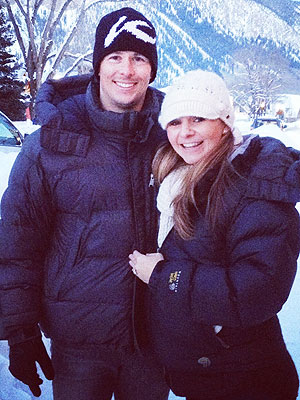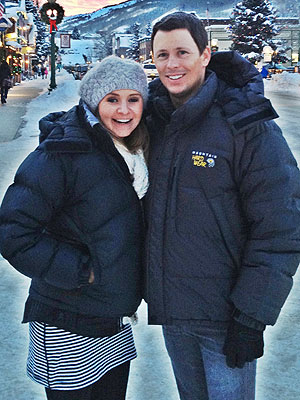 At 28 weeks along – Courtesy Beverley Mitchell
At 28 weeks along – Courtesy Beverley Mitchell
Please give a warm welcome to our newest celebrity blogger, Beverley Mitchell!
Best known for her role as Lucy Camden on the long-running drama 7th Heaven, the actress most recently played Kaitlin O’Malley on The Secret Life of the American Teenager.
Mitchell, 32, and husband Michael Cameron have announced that they’re expecting their first child — a daughter! — in April.
You can find her on Facebook, WhoSay and Twitter @beverleymitchel.
In her latest blog, Mitchell admits that the first trimester wasn’t her favorite — but that the kicks of the second trimester more than made up for it.
(Also, is her husband the only one who speaks to the baby through their wife’s belly button?)
So I have to admit — at the beginning, I was not digging this pregnancy thing. I was truly struggling with the complete and utter loss of control of my body, mind and everything else. The first trimester — and even a good portion of the second trimester — was just, “Ehh.” I was tired. I was cranky. My already weird food aversions got even weirder. All in all, it was tougher than I thought it would be.
The hard part is when people ask you how you’re doing. You smile and say, “It’s all so wonderful” when really all I wanted to say was, “It is weird, my body feels foreign and who knows what’s happening in my head because of all the hormones?” But I smile and say how excited I am (and I truly am excited, I am just not loving this portion — I actually think it kind of sucks!) and carry on.
I find it rare for a pregnant woman to just say it like it is for fear of seeming ungrateful for the gift that is about to present itself, but let’s be honest — it is not all roses and rainbows!
Then come the kicks. The most beautiful thing about pregnancy is when you first start to feel your little human move. Honestly, it wiped away all the frustration from the previous months and instead holds me absolutely captivated by the simplest of things: belly watching. I often find myself lying down and just staring at my bump in complete awe as I watch my little angel move. It truly is remarkable; it is so hard to believe that there really is a little person in there.
I know this has been happening since the beginning of time, but until you feel it first-hand, it is truly one of the most incredible things. Every morning, Michael and I find ourselves lying in bed sharing the miracle that is her morning kicks. My husband talks to her and lays his hand on my belly. Funnily enough, she responds pretty much immediately — she has certainly grown to know who Dad is and rewards him with a fist pump on a regular basis.
It’s also quite a trip when I realize that this little human has a mind of her own. She jumps when startled, moves as she pleases and she is definitely taking on some likes and dislikes. For instance, Baby Girl loves chocolate — she practically does somersaults after my chocolate-chip cookie.
Baby also is not a fan of my current pants selection. (You see, I still haven’t brought myself to buy maternity pants. I’m already seven months along and don’t see the point in spending all that money for just a few months, but I digress.) Anyway, she definitely sends a message when she is feeling cramped and doesn’t like to sit for too long. She sends me right to my room to put on my favorite Bird & Vine sweatpants — they do not apply any pressure to the belly and she seems to be a fan, as am I.
 We spent NYE in Colorado – Courtesy Beverley Mitchell
We spent NYE in Colorado – Courtesy Beverley Mitchell
Needless to say, it has taken a few months and few phone calls from worried friends, but now I get it. Pregnancy is truly a miracle and I am utterly blessed and so madly in love with this little human already.
And watching my husband, who is so attentive and loving, rub my belly and speak to the baby makes my heart melt every time. He is already an incredible father and she isn’t even here yet! Isn’t it funny how men seem to think that your belly button is the direct line of communication to the baby? It honestly makes me laugh every time. It couldn’t be cuter see the man that you love speak into your belly button to tell the baby the plans for the day! Just pure unwavering love.
Now that I’m at 30 weeks, pregnancy has taken a new turn yet again. First frustration, then pure bliss and now as I embark on my third trimester, the true realization that baby will be here soon. Time is running out and in just three more months we will have our little bundle in our arms.
At the beginning, 40 weeks feels like a long time, then all of a sudden you’re where am I now and have no idea where the time has gone. Especially when you are the clever one who decided that an entire house renovation is a good idea after finding out you’re pregnant… I tend to go big — no small projects for this girl.
Lucky for me, I have the most patient and organized husband a girl can ask for. He has taken on this ginormous project I have laid in front of him (I can’t help with most of it because I am a bit off-balance with my growing bump) and there is no doubt that we will get it done just in time for Baby Girl to arrive!
So I’ll be sure to give you an update next time with the progress of the complete home renovation and the exciting adventure of planning the nursery. I have always had an idea of what I would want, but now that April is getting closer, it’s a bit overwhelming. There are so many cute choices! Can’t wait to get started, and don’t worry — I will definitely share the finished product.
Until then, don’t mind me — I’ll just be here staring at my belly in awe watching this precious little being kick and tumble. Leave me a comment below or send me a Tweet @beverleymitchel!
 Best husband ever – Courtesy Beverley Mitchell
Best husband ever – Courtesy Beverley Mitchell
– Beverley Mitchell
More from Beverley’s PEOPLE.com blog series:









